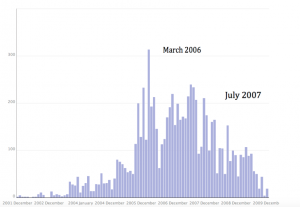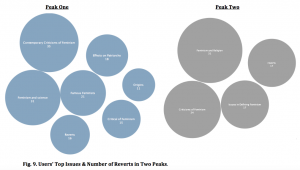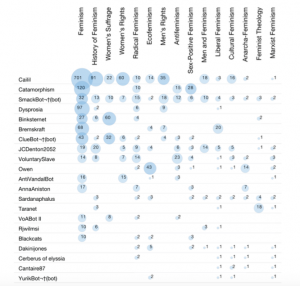This project examines and maps instances of controversy in the Wikipedia article “Feminism.” I argue that controversy and discussion are critical for an article’s development and relative stabilization on this participatory platform. I apply a definition of controversy from Actor Network Theory to Wikipedia’s own protocols and technologies for consensus editing.
Using software designed by the Digital Methods Initiative at the University of Amsterdam, I scraped the editing history of Wikipedia’s ‘Feminism’ article in order to locate points of intense editing activity. I worked with the hypothesis that these bursts of sudden changes in content would signal a controversy that had erupted among editors over how to define this topic. As it turns out, one of the highest points of editing over the article’s history concerned a user that wanted to include a heading called ‘Anti-feminism’ in the article. Accessing the articles archives, I could read the minute-by-minute content changes and also the heated exchanges among editors over this single user, who was ultimately banned from Wikipedia for inflammatory and sexist language. As this research shows, the stabilization of the article only came about after an intense exchange among several editors over whether and how to incorporate misogynistic viewpoints into the article’s content.
[Article Activity Over Time. Numbers indicate activity of 40+ edits per month. Image created by Drew Davis]
This work provides methods for isolating and visualizing instances of controversy in Wikipedia in order to assess its role in an article’s editing history; it investigates ways to track and graphically display controversy and its resolution using the “Feminism” article and its larger network on Wikipedia.
Results from this study can be found in: Currie, M. (2012). The feminist critique: Mapping controversy in Wikipedia. in Berry, D. M. (ed.), Understanding Digital Humanities, Basingstoke: Palgrave Macmillan, 2012, pp. 224-248.
Selected Visualizations
[Two Peaks in Feminism’s Editing History]
[Users’ Top Issues and Number of Reverts during the Two Peaks]
[Top Editors and Their Issues]
Credits
Project conceived in collaboration with Kimberley Spreeuwenberg and with support from Erik Borra and Professor Richard Rogers, for the course Digital Methods at the University of Amsterdam, 2009. Certain images designed by Drew Davis.



